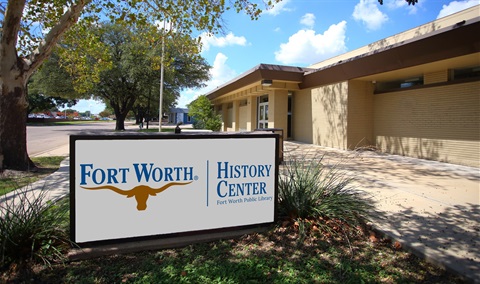Explore the past at the new Fort Worth History Center
Published on May 11, 2023

With a new location providing better access to the public, Fort Worth History Center staff is ready to start a new chapter in its long-running service to the community.
On Oct. 22, 2022, the Fort Worth History Center (FWHC), formerly known as the Genealogy, Local History and Archives Department, opened its new home at the Library's former Seminary South Branch, 501 E. Bolt St., Fort Worth, TX 76109. Before the FWHC opened, staff were based at the Central Library in downtown Fort Worth.
The services and resources remain the same, but the new location adds dedicated space for history-related programs and better access for the public. The location’s manager is hopeful the new location will encourage the community to explore the resources and participate in the unique programming available.
"We’ve seen an increase in the use of our archives collections since our move to our new location - I would say it has more than doubled from what we saw prior to the pandemic," said Linda Barrett, manager of the Fort Worth History Center. "We’ve had several people stop in who said they were driving past and noticed our sign, so they wanted to come in to find out more."
Diana McKinney, a genealogist and frequent visitor of the FWHC, said she had been using the downtown location for several years, and though the new location is farther for her, the free parking makes it easier to get in and out.
 Now retired, McKinney is a member of the Dallas Genealogical Society’s African American Interest Group. Her work mainly focuses on African-American genealogy, but she also enjoys assisting people who come to her with personal heritage projects.
Now retired, McKinney is a member of the Dallas Genealogical Society’s African American Interest Group. Her work mainly focuses on African-American genealogy, but she also enjoys assisting people who come to her with personal heritage projects.
When asked to describe the feeling of making a new connection after hours of research or when helping someone uncover the story of who they are, McKinney blissfully said, “It’s absolutely satisfying, exhilarating, better than sliced bread!”
Whether someone’s looking to piece together their family tree or digging into Fort Worth’s rich history for a paper they’re writing, the FWHC is an invaluable resource for their research.
“Anyone can succeed at research, and the staff at the Fort Worth History Center can help you!” said Barrett.
What resources do visitors have access to?
Genealogy Collection
The FWHC's genealogy collection emphasizes the southern and midwestern states as well as the thirteen original states, although most of the United States is represented.
The FWHC also offers free access to tools such as Ancestry.com Library Edition--only accessible at a Fort Worth Public Library location--as well as other resources that can help with the research of indigenous or enslaved people. A genealogy specialist on staff can also help guide your research.
Archives
The archives focus on regional history, with particular emphasis on Fort Worth and Tarrant County. As part of the official archives for the City of Fort Worth, the Digital Archives also focuses on municipal government history and records.
Over 19,000 items representing 56 collections are currently available, with new material added frequently. The Library offers online, keyword-searchable access to help you find what you need. You can access the collections digitally online and in person by appointment. If you would like to schedule an in-person appointment, please send an email to history@fortworthtexas.gov or call 817-392-6643.
Fort Worth History
Browse local yearbooks, books on Fort Worth history, newspapers, maps and much more online with a valid Fort Worth Public Library Card. If you would like to see the physical items in person, email us at history@fortworthtexas.gov or call 817-392-6643 to schedule an appointment.
 What kind of programs are available?
What kind of programs are available?
The FWHC offers two types of programs: those that entertain and help people enjoy Fort Worth’s history and those that help visitors learn the necessary skills to accomplish their research goals.
“We have begun to hold small classes and presentations in our ‘flex space,’” Barrett said. The flex space is an open area with flip-top rolling tables and plenty of chairs, located near a large-screen display monitor.
Programs expected to have a bigger crowd are held at other locations, such as the Preserving Our Past History Series that has most recently been conducted at the Southwest Regional Library
 Visit the Fort Worth History Center
Visit the Fort Worth History Center
As a destination for education and growth, your Fort Worth Public Library promotes opportunities for lifelong learning, and uncovering the history of people, places and things are great ways to make sure you never stop learning. For passion or profession, we encourage you to explore the digital and in-person resources as well as the unique programming offered by the Fort Worth History Center.
To learn more about the FWHC’s programs and services, visit FortWorthHistoryCenter.org.